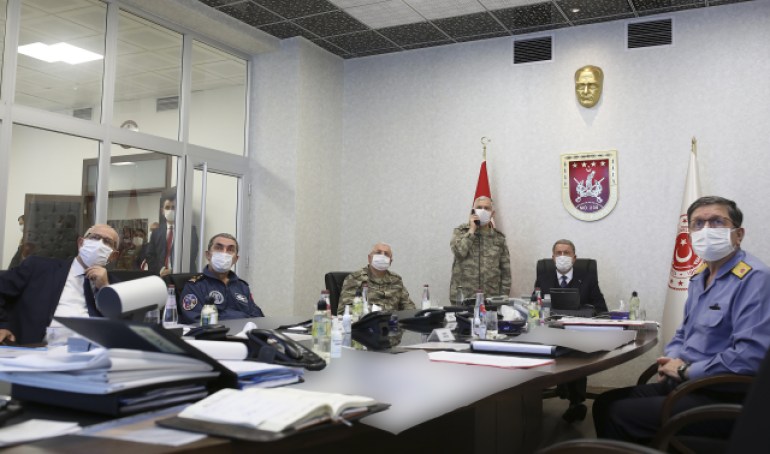Turkey continues its military campaign in northern Iraq against the PKK rebels, and until this hour there has been no reaction from the authorities of the Kurdistan Region of Iraq, but Baghdad has condemned a "violation of sovereignty", and summoned the Turkish ambassador twice within two days to formally protest these operations.
This three parties view the PKK as an unwelcome enemy or guest. For Ankara, the party is a "terrorist organization," as is the case for the United States and the European Union, and represents a "strategic threat" that has cost many money and casualties since 1984, according to Iraqi political analyst Adel Bakwan.
After the independence referendum in Iraqi Kurdistan in 2017, Baghdad described the presence of Hezbollah fighters in the region and the disputed areas with Erbil - which were restored in the same year - as a "declaration of war."
In Erbil, since the territory gained self-rule during the rule of the late President Saddam Hussein in 1991, the PKK imposed its presence in it "because of its military strength", which has strong ties to the main Iraqi Kurdish parties, according to Bakwan.
This party - which presents itself as the bearer of the Kurdish issue in the Middle East - is in fact a competitor to the Kurdistan region of Iraq, the only Kurdish entity that has won autonomy for its population of 5 million, unlike the Kurds in Syria, Turkey and Iran.
Bakwan says, "The PKK leadership does not recognize the autonomy of Iraqi Kurdistan," noting that there is a "long-term war between the Kurds. On the one hand there is the Kurdistan Democratic Party (and its leader, Massoud Barzani, in Erbil) and the Patriotic Union of Kurdistan (founded by the late President Jalal Talabani). Supported by Turkey and the PKK on the other hand. " As a result, "it is inconceivable that Turkish forces would enter without actual cooperation from the Iraqi Kurdistan authorities."
why now?
The PKK headquarters are located in several areas on the Iraqi-Turkish border, starting from the town of Zakho and passing through the Zab region in the Amadiya district in northern Dohuk, to the north of Erbil in the regions of Bradost and Khwakurk and the foot of Qandil Mountain located between the provinces of Erbil and Sulaymaniyah.
This is not the first time that Turkey has launched attacks against the PKK inside Iraqi territory. It carried out a ground attack in 2007, and another two years ago, during which it was able to install permanent points inside Iraqi territory with a depth of 30 km.
Turkey maintains more than 10 military sites since 1995 inside Iraqi territory in the Dohuk Governorate.
But today, in a tense political context for Turkish President Recep Tayyip Erdogan and the ruling Justice and Development Party, Iraq is one of the bases in which it reaffirms Turkish strength.
Bakwan explains that Ankara "is firmly committed in Syria and Libya, and wants to be so in Yemen. Its plan is to present itself as a primary force in settling disputes in the Middle East, and Iraq is part of that."
More than ever, Erbil today tends to accept any settlement with Turkey, its only outlet to the sea to export its barrels of oil, and the generous financier who lent it $ 5 billion to pay employee salaries in 2014.
The Kurdistan Region of Iraq has not paid the salaries of its employees for several months to date, coinciding with the stopping of its negotiations with Baghdad.
#Ministry of Foreign Affairs summons Turkish Ambassador @FATIHYILDIZ_MFA in # Iraq again today, and receives a strong protest note calling for it to desist from such provocative acts https://t.co/oLyRtGmFsO
- Iraqi Ministry of Foreign Affairs (@Iraqimofa) June 18, 2020
What will change?
On the diplomatic front, nothing big can happen, but the balance of regional power will certainly be negotiated.
Iraqi Kurdish political analyst Hoshyar Malu notes that "Turkey violates international law in exchange for a timid position on the Iraqi government" regarding the first airstrikes, which did not prevent a ground operation.
On Tuesday, Baghdad summoned the Turkish ambassador to it and delivered him an official protest letter, as it summoned it again on Thursday and delivered a strongly worded protest note, but this time it was the undersecretary who met the ambassador and not the foreign minister himself as usual.
Turkish Ambassador Fatih Yaldi responded via Twitter by saying that he had informed the Iraqis that Ankara would continue its movement against "terrorism" as long as Baghdad did not interfere to expel the PKK.
Iraqi Foreign Minister Fuad Hussein - who is close to Masoud Barzani - has yet to comment on the matter.
According to Bakwan, turning a blind eye to the Kurdistan region of Iraq, regardless of the Turkish process, "presents himself as a partner on the regional scene and strengthens his weight," but in return he "distorts his reputation as a national player and political representative of the Kurds."

